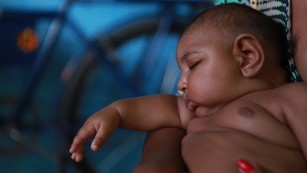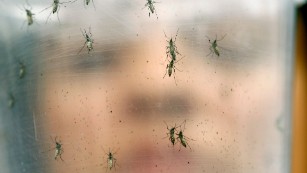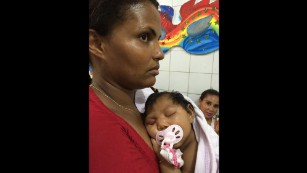Recife, Brazil – When Rafaela Oliveira dos Santos, 20, gave birth to her second child last October, she never imagined the challenges to come.
Her baby, Luiz Felipe, was born with microcephaly, a rare neurological disorder with long-term physical and mental repercussions that has been linked to the mosquito-borne Zika virus that is spreading throughout the Americas.
“At first, I wasn’t concerned because the doctor where I delivered didn’t tell me there was anything wrong,” Santos said, as she cradled her baby in her arms. “It wasn’t until I turned on the television that day that I first heard of Zika.”
The Zika virus was first detected in Brazil last April. It’s transmitted by the aedes aegypti mosquito, which also carries dengue, chikungunya and the West Nile virus. While its symptoms — fever, rash and joint pain — are relatively mild, health officials around the globe believe the virus is associated with a surge in microcephaly cases, a birth defect that causes babies to be born with abnormally small heads.

Luiz Felipe is among the more than 4,000 cases that have been reported in Brazil in the past few months — a significant increase compared to the 147 cases reported nationally in 2014.
The drought-stricken impoverished state of Pernambuco has been the hardest hit, registering 33% of recent cases. In the capital, Recife, Oswaldo Cruz Hospital has become the main triage center for confused mothers from all over the state.
“One day, two or three cases arrived, then it increased to four, then to 20,” said Dr. Angela Rocha, a pediatric infectologist who has treated many of these infants. “Now, we don’t know when this is going to stop. It’s a disease that does not have a vaccine yet, the only way to control it is to eliminate the vector.”

Many of the affected mothers, such as Santos, live in precarious homes near standing water and open sewage systems that are fertile grounds for the female mosquito that carries the virus.
To control the spread, the Brazilian health ministry announced plans to deploy more than 220,000 troops throughout the country to treat potential sites of larvae nests, such as water drums and flower pots.
Doctors are advising pregnant women to wear mosquito repellent and long sleeves during daytime hours. Some, such as Rocha, are even going as far as recommending they postpone getting pregnant.
“The whole world needs to be on high alert now,” Rocha said. “We still don’t know what other proportions it could take.”
According to the Centers for Disease Control and Prevention, Zika has already been detected in more than 25 countries. In Rio de Janeiro, local authorities have pledged to fumigate on a daily basis in the venues where the 2016 Olympic Games will be held, beginning as early as April.

As for Luiz Felipe, Santos said she will continue to take him to physical therapy three times a week during her maternity leave. She is scheduled to return to her job as a store clerk in March, and, as the sole breadwinner in her family, fears continuing his care in the long term could be challenging.
“God only knows the limitations that await him. Doctors say he could lose his sight, his hearing, his ability to walk or that he could have severe brain damage,” Santos said. “What gives me strength is the love I feel for him and knowing that he’s not alone.”
As reported by CNN
